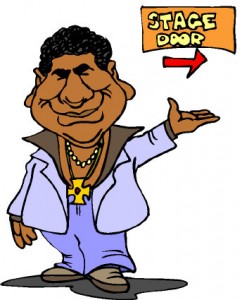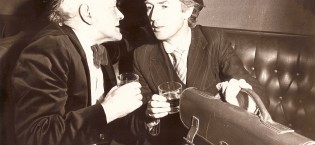Darling, You Were Wonderful
 One of the main problems with theatre first nights is that you never know what to say afterwards. “You were wonderful, darling,” is what people are meant to remark to each other according to popular myth, though I must admit I’ve never heard anyone actually say it in my considerable experience of these unholy rituals. But if you know someone in the cast well enough to have to “go back” after the final curtain, you undoubtedly have to say something or other, and really you can’t win. If you genuinely liked the show, it sounds insincere to say so, but if you didn’t it’s better to be insincere anyway and pretend you did.
One of the main problems with theatre first nights is that you never know what to say afterwards. “You were wonderful, darling,” is what people are meant to remark to each other according to popular myth, though I must admit I’ve never heard anyone actually say it in my considerable experience of these unholy rituals. But if you know someone in the cast well enough to have to “go back” after the final curtain, you undoubtedly have to say something or other, and really you can’t win. If you genuinely liked the show, it sounds insincere to say so, but if you didn’t it’s better to be insincere anyway and pretend you did.
Anyone who realises what actors have to go through on these miserable occasions knows that the last thing they want is honesty. Standing up there saying a lot of other people’s lines that may or may not work, and facing a mixture of stony-hearted fellow pros and flinty-souled critics (the Pilgrimage to Knock, as the late Cecil Sheridan dubbed them) they’ve already been through an experience like nothing so much as early Christians being thrown to the lions. Their thoughts are probably now exclusively focused on the soothing pint that awaits them in the nearest bar, so the “friend” who comes in and gives them a searching analysis of the faults of the play and performance is not likely to have them hanging on his every word.
There are those who can’t bring themselves either to dissemble or to tell the ghastly truth. One very well-known playwright comes into dressing rooms after plays and, in a voice booming with insincerity, says: “Well, you’ve done it again!” Who does he think he’s fooling? Another equally famous actor came into a friend’s dressing room once after a play and after a silence of aeons could only bring himself to say, “the set was very red, wasn’t it?” My own method, I admit unblushingly, is to lie through my teeth. Whether I think the night was fair or foul you’ll hear nothing from me but, “brilliant!”, “superb!”, “I never saw you better” (capable of more than one meaning, I admit) and even, if I have to, “You were marvellous, darling”. Six months later, when the scars are beginning to fade and the memory is only a slight, throbbing ache I may tell the victims what I really thought.
My personal involvement in these ceremonies of sadism have been as an author. My hero in this regard is the late Cole Porter, who would gather together a large party of friends and relations for the first nights of his shows, sit in the front of the circle, roar with laughter at all his own jokes, applaud like a machine gun, and make remarks like: “It’s terrific, isn’t it?” at the top of his voice. Probably all that confidence had to do with the fact that he was seriously rich long before he ever wrote a line. Truth to tell, a playwright at his own first night is about as useful as a condom in a convent. Nothing remains for him to do but to hang around the back of the stalls, wincing every time someone gets one of his lines wrong, or trying to draw consolation from the solitary laugh that greeted his wittiest sally (it probably came from his mother).
Mind you, audiences seem to have got milder in recent years. Even in my own time it was not uncommon for first nights to be enlivened by cries of “disgraceful”, “you’re no Irishman”, or “the Christian Brothers were never like that”. For better or worse the playwright is usually irresistibly drawn to his own first night, in the way criminals are reputed to return to the scene of their crimes. An no matter how badly things turn out I’ll always comfort myself with the belief that they couldn’t be worse than an incident at La Scala, related in the memoirs of Zeffirelli. They follow their opera stars like football teams in Italy, so once, as a world-famous soprano launched into a major aria, the supporters of a rival diva threw a cat attached to a parachute from the highest balcony of that enormous theatre. It descended slowly to earth with a caterwauling that drowned out even the legendary voice on stage. Now that’s what I call a first night to remember.
from The Irish Times, by Fergus Linehan, Date Unknown
Tags: Drama Criticism, First Nights, Press Reports






